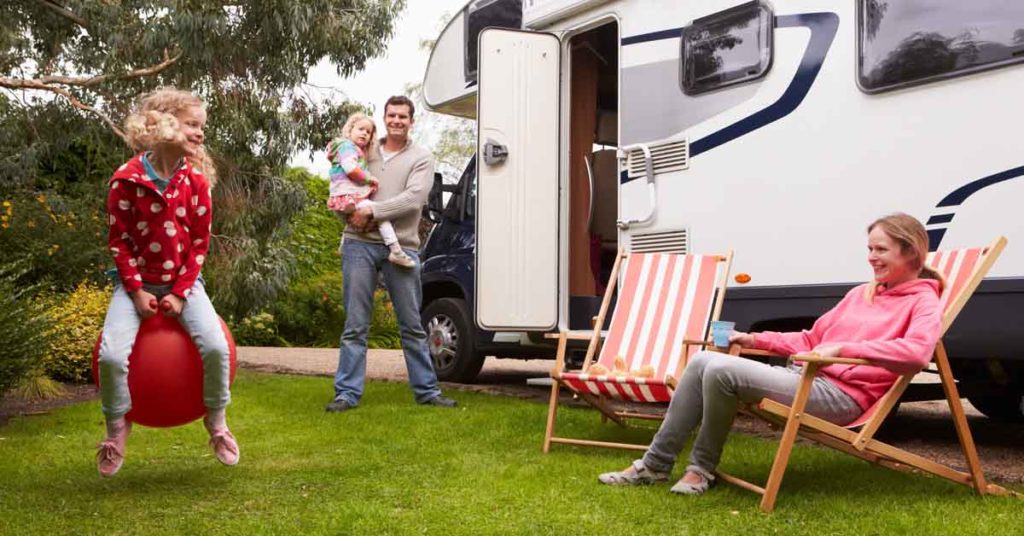Some of my best memories as a child were camping trips taken with my aunt and uncle and three cousins. They had a pop-up camper and spent a couple of weeks each summer at Shad Landing in the Pocomoke State Park. These were experiences that I will never forget. It is well known that camping can enhance children’s mental and physical well-being, stimulate cognitive development, and improve concentration and reduce stress. RV camping with kids can create memories that will last a lifetime.
Here are a few ideas that can help you and your kids enjoy your camping experience, connect with each other, and connect with nature:
 Involve the kids in the process
Involve the kids in the process
Get the kids excited about your camping trip in advance! Share photos of the campground you’re planning to visit and discuss all the fun things you will do. Involve them in every aspect of planning.
Do research together on places to go and things to do. Have them help organize things to bring, pack their clothes, books, and games. Have them select fun and healthy snacks, make trail mix, or plan a meal. Give them responsibilities for taking care of the campsite during your stay. Involving kids in the process fosters independent thinking, and teaches them the value of teamwork.
Take a break from technology
Although we love our technology, a common complaint is that we spend too much time on our smartphones. Camping trips are a good time to break that habit. It’s important for all of us to get out there and experience the real world, socialize, and interact with people in person instead of on social media. It’s even more important for your family because taking a break from technology will improve your relationship with your kids.
Connect with nature
The benefits of getting outside and exploring nature are many. Unstructured play time out in nature enhances confidence and promotes creativity and imagination. Being out in nature gets kids moving and makes them think, and connecting with nature reduces stress and anxiety.
Many campgrounds have lots of ways you can spend quality time outdoors with your kids discovering the natural world. Here are some great ideas from The Child Mind Institute that can help you get your kids more involved in nature.
- Set up treasure hunts. Make a short, simple list of things for your kids to look for outside—such as “a shiny object,” or “something you can hold liquid in.” The satisfaction of finding the objects turns it into a reinforcing activity, and it will keep them outside in search of the next list item.
- Identify things. Get a book—with pictures—about birds, bugs, leaves, trees, or flowers in your local area, and go outside looking for specific creatures in the book to identify. Matching leaves to pictures and names has a reinforcing treasure hunt kind of appeal. The same goes for bird calls.
- Start a collection. You can find small parts of nature like rocks or shells almost everywhere, and starting a collection adds appeal, giving a kid motivation to search and therefore spend time outdoors. Just make sure you’re not in a state park—most have rules that don’t let you bring anything home.
- Use the technology to your advantage. If your kid is hooked on any and all electronic devices, have him bring along a camera or phone and create video or photo journals of various nature trips. He’ll still be near a piece of technology, but he’ll be using it to focus on the world around him.
- Go fruit or vegetable picking. Coming home with a basket of food that they’ve gathered on their own is both rewarding and might make them appreciate their food, and where it comes from, more.
- Take a hike. Walking on a trail to a waterfall or breathtaking view also gives kids a sense of accomplishment, rewarding them for their physical efforts during the hike. This goes for bike rides, too. If there’s a swimming hole at the end, they’ll even be able to cool off. Just don’t forget to bring snacks and take short breaks to keep their energy up!
- Make art projects. For the kids who would rather sit inside with some arts and crafts, get them to use objects from nature for their art. Picking flowers to press onto paper, using berry juice as paint, or collecting pinecones and rocks to decorate are ways to infuse nature into activities they already enjoy.
Conclusion
Camping with kids provides lots of opportunities to get everyone moving and engaged. Spending quality time as a family doing fun things together helps families develop stronger bonds and better communication. Meeting new people, making friends, and socializing are also important aspects that can help your children develop valuable social skills. Studies have shown that promoting these types of activities can provide lifelong health and happiness for you and your kids.
So, are we there yet? Have you got some tips you would like share for families RV camping with kids?

Trackbacks/Pingbacks